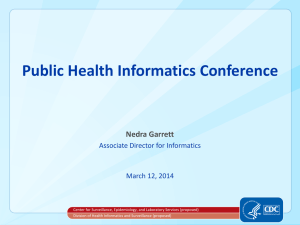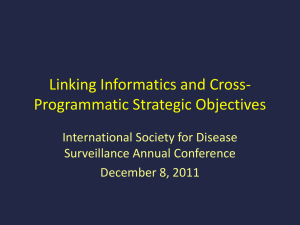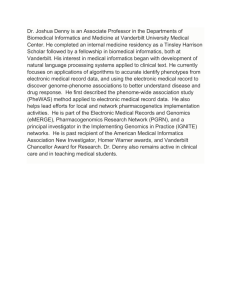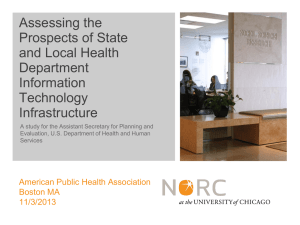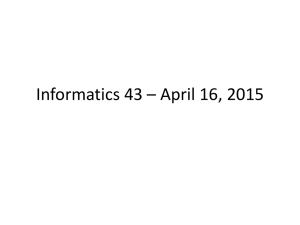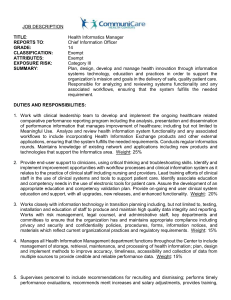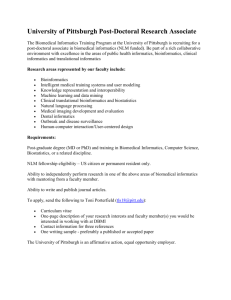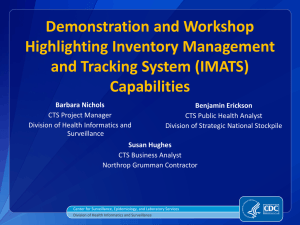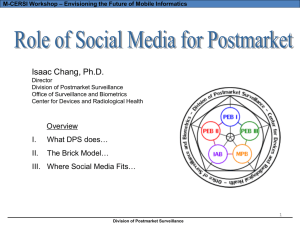Agenda for the Virtual Meeting on Population Health Decision
advertisement
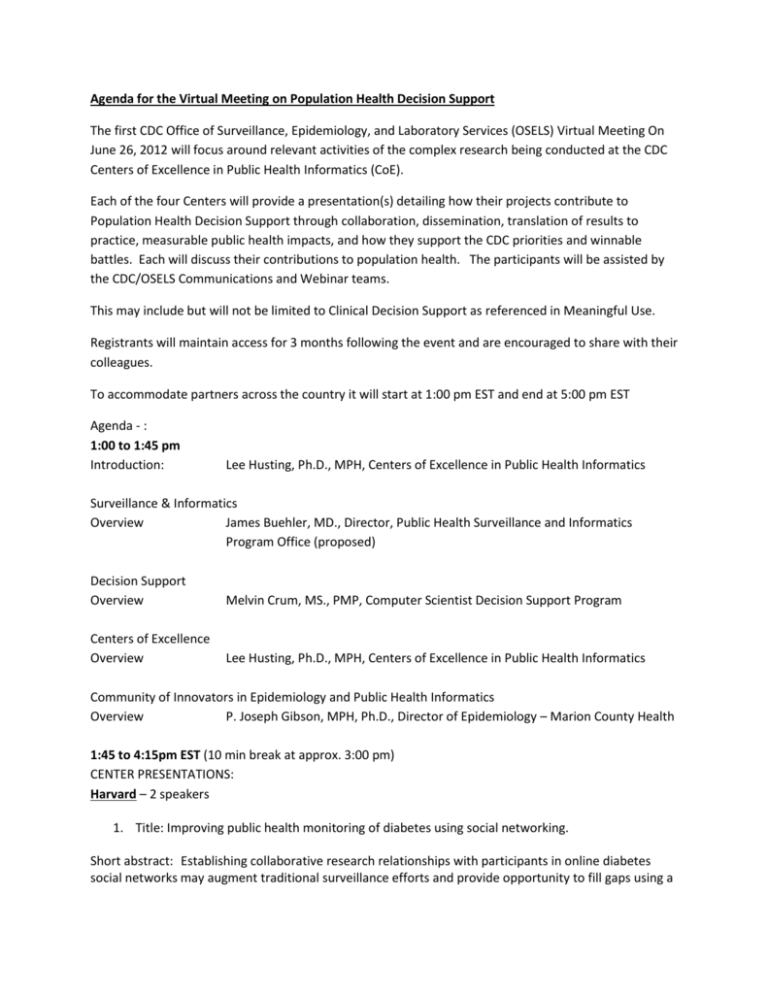
Agenda for the Virtual Meeting on Population Health Decision Support The first CDC Office of Surveillance, Epidemiology, and Laboratory Services (OSELS) Virtual Meeting On June 26, 2012 will focus around relevant activities of the complex research being conducted at the CDC Centers of Excellence in Public Health Informatics (CoE). Each of the four Centers will provide a presentation(s) detailing how their projects contribute to Population Health Decision Support through collaboration, dissemination, translation of results to practice, measurable public health impacts, and how they support the CDC priorities and winnable battles. Each will discuss their contributions to population health. The participants will be assisted by the CDC/OSELS Communications and Webinar teams. This may include but will not be limited to Clinical Decision Support as referenced in Meaningful Use. Registrants will maintain access for 3 months following the event and are encouraged to share with their colleagues. To accommodate partners across the country it will start at 1:00 pm EST and end at 5:00 pm EST Agenda - : 1:00 to 1:45 pm Introduction: Lee Husting, Ph.D., MPH, Centers of Excellence in Public Health Informatics Surveillance & Informatics Overview James Buehler, MD., Director, Public Health Surveillance and Informatics Program Office (proposed) Decision Support Overview Melvin Crum, MS., PMP, Computer Scientist Decision Support Program Centers of Excellence Overview Lee Husting, Ph.D., MPH, Centers of Excellence in Public Health Informatics Community of Innovators in Epidemiology and Public Health Informatics Overview P. Joseph Gibson, MPH, Ph.D., Director of Epidemiology – Marion County Health 1:45 to 4:15pm EST (10 min break at approx. 3:00 pm) CENTER PRESENTATIONS: Harvard – 2 speakers 1. Title: Improving public health monitoring of diabetes using social networking. Short abstract: Establishing collaborative research relationships with participants in online diabetes social networks may augment traditional surveillance efforts and provide opportunity to fill gaps using a platform suitable for longitudinal tracking, feedback and intervention with engaged cohorts. This capability is vital to addressing the diabetes epidemic and may have cross-disease translation potential. Presenter: Elissa R Weitzman, ScD MSc, Assistant Professor, Harvard Medical School and Boston Children's Hospital 2. Title: Automated chronic disease surveillance and visualization using electronic health record data Short abstract: Electronic health record (EHR) systems constitute a vast repository of clinical data that can provide a rich picture of population health. We will explore the chronic disease surveillance module of the Electronic medical record Support for Public Health (ESP) surveillance platform. In particular, we will focus on methods to classify diabetes types using structured EHR data and our automated visualization tool for population level summary data, the RiskScape. Presenter: Michael Klompas, MD Assistant Professor of Population Medicine, Harvard Medical School and Harvard Pilgrim Healthcare Utah – 1 speaker Title: Addressing public health needs through Public Health Informatics Translational Research: the Utah perspective Short abstract: Innovative public health informatics research requires collaboration between the research and public health practice domain. The Rocky Mountain Center of Excellence (COE) in Public Health Informatics, housed at the University of Utah, has built a collaborative partnership between multiple public health partners and academic researchers to conduct action-oriented, public health practice-based research to advance core public health missions. We will share six years of experience with integrating epidemiology and informatics, employing methods and models from computer and behavioral science, and promoting organizational partnerships and participatory research principles. Our recent COE research has two foci: 1) Development and implementation of a visual analytic and decision support system to enhance community health assessment and public health surveillance; and 2) Development of new methods for representing and sharing public health ‘knowledge’ with clinical and lab systems to meet public health goals. Development efforts are based on systematic evaluation of current public health reporting specifications and current practices and functionality in clinical laboratories throughout the US. We will describe these current efforts, as well as various tools that have been developed and other less obvious benefits to a collaborative partnership for innovation. Presenter: Catherine Staes, BSN, MPH, PhD Indiana – 1 speaker Title: Improving Population Health through Enhanced Targeted Regional Decision Support Short abstract: Public health is increasingly repurposing clinical data for various uses. We describe a novel prototype public health decision support system designed to improve clinician reporting of notifiable conditions to public health. The system leverages Health Information Exchange (HIE) data captured from present and previous clinical encounters to improve case identification and reporting processes. We also describe the quantitative framework we will use to evaluate the effectiveness of the system. Presenter: Shaun Grannis, MD Research Scientist, Regenstrief Institute, Inc.; Associate Professor of Family Medicine, Indiana University School of Medicine Pittsburgh – 1 speaker Title: Probabilistic Disease Surveillance and Population Health Short abstract: This talk will describe (1) a probabilistic case detector that computes a probabilistic differential diagnosis for each individual in a monitored population, (2) a probabilistic outbreak detection and characterization system that computes the probability that an outbreak of a monitored disease is ongoing in a population and a set of most likely epidemic models for the outbreak. The talk will also present a video of an influenza monitoring system based on the case and outbreak components that is deployed in Allegheny County, PA. Presenter: Michael Wagner, MD, PhD, Associate Professor of Biomedical Informatics and Intelligent Systems, University of Pittsburgh 4:15 to 5 pm PANEL DISCUSSION and Conclusion

